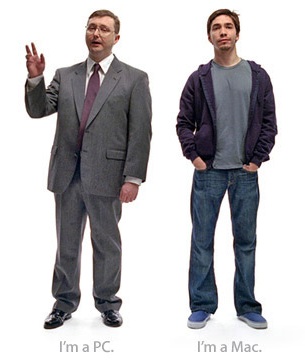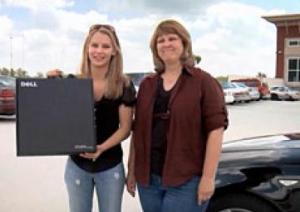Cool Smarts
Who would have thought Microsoft could be cool?
Not Microsoft the company, the product line or substandard tech support. No, Microsoft marketing is cool because they engineered a reverse promotion campaign that leveraged a competitor’s positioning, used it to attack their weakness and amplify a Microsoft strength all in one sweep.
That’s cool.
 Anyone with a pulse is familiar with the great ad campaign designed by Apple, pitting a dowdy looking actor as a generic PC, and a young hipster (Justin Long in real life) as a Mac. Justin played the Mac role as low key, friendly, effective, peaceable and, in a sub dude way, cool. Justin was also the voice of Alvin in Alvin and the Chipmunks, so we have to subtract three ‘cool points’.
Anyone with a pulse is familiar with the great ad campaign designed by Apple, pitting a dowdy looking actor as a generic PC, and a young hipster (Justin Long in real life) as a Mac. Justin played the Mac role as low key, friendly, effective, peaceable and, in a sub dude way, cool. Justin was also the voice of Alvin in Alvin and the Chipmunks, so we have to subtract three ‘cool points’.
For a company built primarily on image and vendor lock-in, Apple did a great job. Their ads were memorable and also provided a method for serially picking on the weaknesses of Windows. They made being a Mac cool and being a PC a crime against humanity. Combined with the everlasting Windows Vista fiasco, the campaign seriously damaged Microsoft sales, brand and market mindshare.
Microsoft used judo.
Like most take-down martial arts, judo recommends using your opponent’s weight against them. Don’t bother hitting a 260 linebacker in the face because it might merely amuse him. Instead let him charge you and then help him convert his forward momentum into downward momentum. Once he in on the floor and you are standing over him you can then either run like hell or execute a ‘ground-and-pound’ attack.
Microsoft grounded and is pounding Apple.
Take the basic premise of the Apple ads, which paraphrased is “Macs are cool and PCs are a headache.” These concepts were communicated by actors as proxies for operating systems and hardware. In the process Apple made ‘PC’ a dirty word, which was their intent. They wanted to position Macintoshes as the un-PC. Apple’s ad campaign was so successful, that they created momentum.
 Microsoft responded with their “laptop hunter” ad campaign, and in doing so Microsoft used Apple’s momentum against them, changing the basic conflict between Apple and Microsoft. Apple said Macs are cool, but Microsoft said PCs are smart. The average consumer knows they will never be cool, so being smart is an attractive option.
Microsoft responded with their “laptop hunter” ad campaign, and in doing so Microsoft used Apple’s momentum against them, changing the basic conflict between Apple and Microsoft. Apple said Macs are cool, but Microsoft said PCs are smart. The average consumer knows they will never be cool, so being smart is an attractive option.
Let us itemize things Microsoft marketing did to judo Apples ads:
- Apple used actors – Microsoft used real people in real stores (Fry’s no less).
- Apple picked on Windows weaknesses – Microsoft promoted their strength, namely getting more bang for the buck (smart consumerism).
- Apple only sold against Windows, not promoting their strengths – Microsoft buyers are shown listing their required features and “getting what I want” for less.
- At the end each of those real consumers says “I’m a PC”.
Central to all of this is that Microsoft took Apple’s momentum in creating a negative “I’m a PC” stereotype and used it to sell Windows market strengths. When paired with allegedly real consumers shopping, comparing and choosing PCs, Apple’s momentum becomes Microsoft’s momentum. Using real consumers also eliminated the advertising advantage Apple obtained with actors (and given that Justin stared in such epic cinematic endeavors as Happy Campers and Idiocracy, we can take him only so seriously).
In promotions, perception is everything. Apple had a good start by amplifying dissatisfaction with Windows weaknesses, but they did not capitalize on their own momentum by shifting the focus of their ads to Mac strengths. Microsoft was able abscond with that momentum and used it to sell Windows market strengths with more authenticity.
The genius was that they did not stand toe-to-toe with Apple and slug it out. They hijacked Apple’s efforts and picked their pockets in one smooth move.
That’s smart and cool.